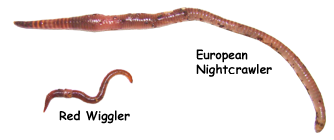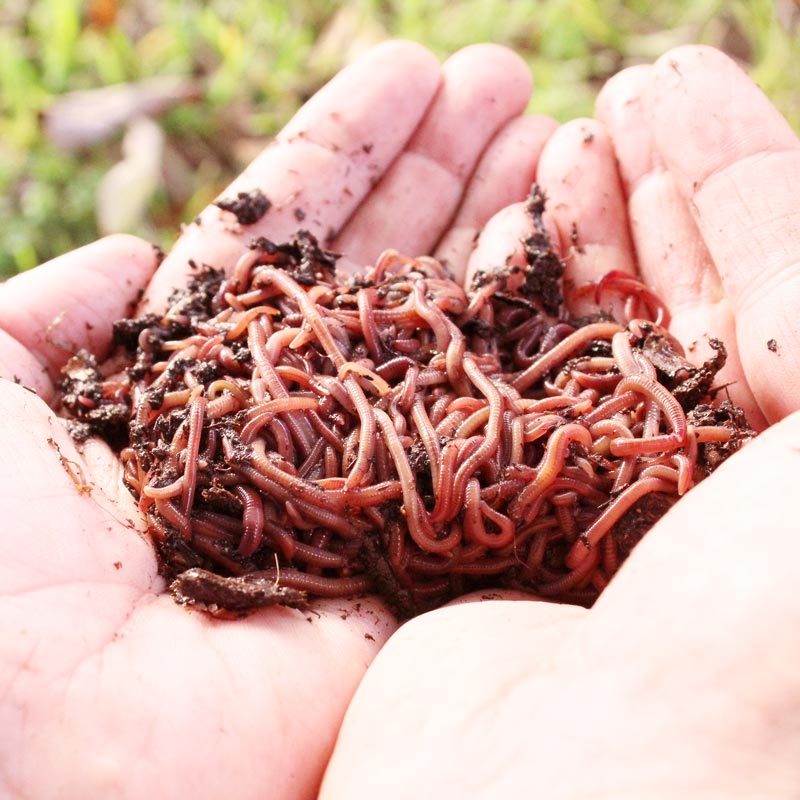Red Wiggler Worms - Effective Decomposers for Your Garden Compost Container
Red Wiggler Worms - Effective Decomposers for Your Garden Compost Container
Blog Article
Discovering the Interesting Globe of Red Wiggler Worms: Lasting Solutions for Waste Monitoring and Dirt Health And Wellness
Within the detailed web of sustainable solutions for waste management and dirt health, one often overlooked yet tremendously beneficial gamer emerges - the red wiggler worm. These modest animals, with their ravenous cravings for natural issue, hold the trick to transforming waste right into nutrient-rich garden compost. As we peer into the fascinating world of red wigglers, a much deeper understanding of their function in the environment unravels, clarifying their prospective to transform the means we approach garbage disposal and soil fertility.
The Role of Red Wigglers in Waste Monitoring
Using red wiggler worms in waste management procedures demonstrates a efficient and sustainable approach for natural issue decay. These voracious composting champs belong to the varieties Eisenia fetida and are renowned for their capability to damage down food scraps, paper, and other natural products into nutrient-rich garden compost. Red wigglers excel in transforming cooking area waste and yard particles into vermicompost, a useful source that can boost dirt fertility and framework.
Red wigglers play a crucial role in waste administration by taking in and absorbing organic matter, consequently decreasing the quantity of waste that ends up in landfills. Their digestive procedure not only helps to draw away waste from typical disposal methods yet additionally creates premium compost that can be made use of in horticulture, agriculture, and landscaping. Additionally, the castings left by red wigglers are rich in necessary nutrients like potassium, nitrogen, and phosphorus, making them a all-natural and lasting choice to chemical fertilizers.
Benefits of Vermicomposting With Red Wigglers

One trick benefit is the speed at which red wigglers damage down organic products. These worms have a voracious hunger and can process big quantities of food waste quickly, leading to faster compost manufacturing contrasted to standard methods. Furthermore, the vermicompost produced by red wigglers is abundant in vital nutrients like phosphorus, potassium, and nitrogen, making it an exceptional natural plant food for plants.
Additionally, vermicomposting with red wigglers helps divert natural waste from land fills, decreasing greenhouse gas discharges and adding to a more lasting waste management system. By recycling raw material through vermicomposting, areas and people can lessen their environmental impact while developing a useful resource for boosting soil structure and fertility. In general, the advantages of vermicomposting with red wigglers make it a eco-friendly and affordable solution for managing natural waste and boosting dirt health and wellness.
Red Wigglers: Nature's Dirt Engineers
Recognized for their exceptional capability to change the structure and high quality of soil, red wigglers play an essential duty in boosting community dynamics via their dirt design prowess. These simple earthworms tunnel via the dirt, producing passages that boost oygenation and water infiltration. By doing so, they promote origin growth and nutrient uptake by plants, inevitably adding to boosted soil go to these guys fertility. Red wigglers likewise break down raw material like decaying leaves and plant debris, transforming them right into nutrient-rich spreadings that enhance the dirt with crucial minerals and beneficial microbes. Their continuous activity helps to mix dirt layers, dispersing nutrients extra evenly and developing a healthy and balanced setting for soil microorganisms.

Red Wigglers and Soil Health
With their profound effect on soil structure and environment characteristics, red wigglers are critical in supporting dirt health and wellness through their diverse dirt design tasks. These modest creatures play an essential function in enhancing dirt fertility and framework. Red wigglers damage down raw material, such as decomposing leaves and kitchen area scraps, right into nutrient-rich spreadings that improve soil high quality. Their burrowing tasks develop tunnels that freshen the dirt, allowing far better water seepage and root development. By increasing microbial activity in the dirt, red wigglers aid in vitamins and mineral cycling, making vital nutrients a lot more readily available to plants. Moreover, their castings have useful germs that help reduce damaging pathogens, promoting plant health and wellness. Red wigglers also add to soil gathering, which enhances dirt framework and security, reducing disintegration dangers. In general, the visibility of red wigglers in the soil is a clear indication of a healthy and lively ecosystem, showing the essential role they play in preserving dirt wellness and sustainability.
Implementing Red Wigglers for Sustainability
By presenting red wigglers into composting systems, organic waste can be successfully transformed into nutrient-rich vermicompost, decreasing read the article the requirement for chemical fertilizers and closing the loop on organic issue use. The spreadings generated by red wiggler worms are abundant in advantageous microorganisms and enzymes that improve dirt framework, enhance water retention, and promote plant growth.
Along with throw away monitoring, red wigglers likewise play an important function in lasting food manufacturing. Their capability to swiftly refine raw material not only decreases greenhouse gas emissions from decaying waste however likewise supplies a sustainable source of healthy protein for animals and aquaculture feed. Incorporating red wiggler worms right into agricultural systems represents a basic yet effective option for enhancing sustainability, promoting circular economic situations, and protecting our valuable natural resources.
Conclusion
In conclusion, red wiggler worms play a critical function in waste monitoring with vermicomposting, benefiting both the environment and dirt health and wellness. Their capacity to break down raw material and improve soil structure makes them important allies in lasting practices. By carrying out red wigglers right into waste administration systems, we can lower waste, improve soil top quality, and promote environmental sustainability for a healthier earth.
Recognized their website for their impressive capacity to transform the structure and top quality of soil, red wigglers play an important role in boosting environment dynamics through their soil engineering prowess. Overall, red wigglers are vital dirt engineers that play an important role in keeping dirt health and advertising lasting ecosystem operating.
With their profound effect on dirt make-up and ecosystem dynamics, red wigglers are instrumental in supporting soil wellness with their varied dirt engineering tasks. Red wigglers additionally add to soil aggregation, which boosts dirt framework and stability, minimizing erosion threats. Generally, the presence of red wigglers in the soil is a clear sign of a dynamic and healthy and balanced ecosystem, demonstrating the important duty they play in preserving soil health and wellness and sustainability.
Report this page